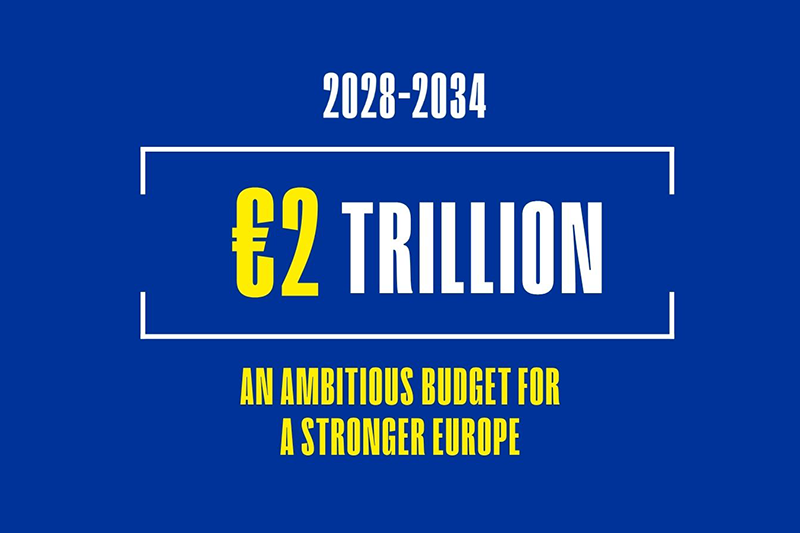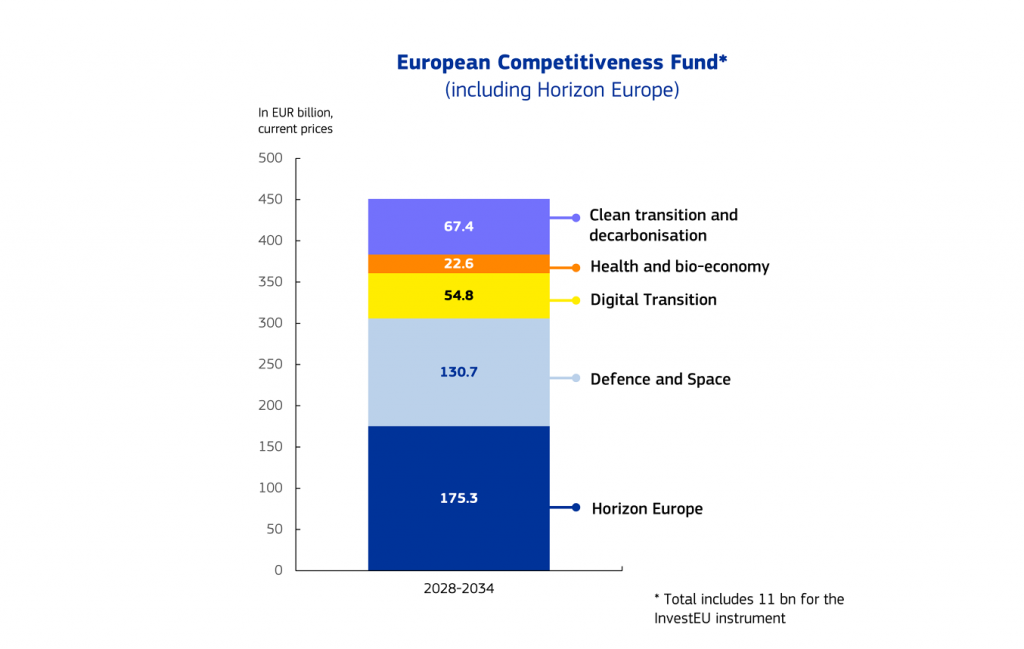
- Category: Library
- 2025-07-22
In the communication “A dynamic EU Budget for the priorities of the future – The Multiannual Financial Framework 2028-2034”, the EC proposes a budget of €1.98 trillion (1.26% of EU GNI) for the EU in 2028–2034. This budget is a strategic tool to reinforce the Union’s independence, competitiveness, and global role amid geopolitical tensions, climate imperatives, and technological challenges.
The Multiannual Financial Framework (MFF) focuses on a simpler, more flexible, and results-driven structure. It consolidates existing programmes, emphasises performance-based delivery, and ensures robust financial oversight rooted in EU values and the rule of law. A new governance mechanism and inflation protection are introduced to maintain budgetary predictability and responsiveness.
The proposal of the new MFF allocates €131 billion to the defence and space window of the European Competitiveness Fund to support investment in defence, security and space, five times more funding at EU level compared to the previous MFF.
The European Commission took into account the feedback received to the public consultations run in previous months to gather insights on Union funding for competitiveness and for civil protection, preparedness and response to crises. Concerning competitiveness, the proposed MFF foresees measures (to be defined in national and regional partnership plans) to increase funding for strategic priorities of the EU, ensuring continuity in funding from research to manufacturing, and limiting Union dependencies in strategic sectors.
The EC also acknowledges the need to align research, industrial policy and funding tools and to accelerate the uptake of the EU distinctive assets, including the EU Space Programme, by civil society, starting with supporting the digitalisation of public administrations and the harmonisation of public procurement.
In addition, the MFF promises to strengthen the European single market, facilitating access for European companies, and in particular SMEs and start-ups, with privileged mechanisms for trans-national value-chains for Europe’s strategic sectors.
As expected, the MFF links space to security and defence, but it also highlights the strategic role of space in areas such as civil protection, crisis management, and climate monitoring. It will be important for EU programmes and the national and regional partnership plans to duly account for the need to continue supporting companies in the downstream space sector across all domains. This is essential not only to avoid limiting the benefits of space to defence and security, but also to maximise its contribution to European society, economy, and environment as a whole.
KEY POLICY AREAS AND FUNDING ENVELOPES
1. National and Regional Partnership Plans – €865 billion
National and Regional Partnership Plans will allow to better target investments to local needs. Member States, Regions, local communities and all other relevant stakeholders shall work with the EC to design and implement such plans, which will integrate 14 current funds under one framework, with Member State-led investment and reform programmes covering, among others:
- Cohesion: €453 billion
- CAP and fisheries (income support): €295 billion
- Migration and border management: €34 billion
- Social Climate Fund: €50 billion
They also incorporate a Social target of 14% of investment and accommodate territorial flexibility while enforcing the rule of law.
2. European Competitiveness Fund (ECF) – €409 billion

An additional Regulation proposes the establishment of the European Competitiveness Fund (ECF), a central instrument to enhance EU competitiveness, consolidating and simplifying funding for:
- Research & Innovation
- Industrial decarbonisation
- Digital and health technologies
- Security, defence, and space
3. Horizon Europe – €175 billion
The EU research framework, with its flagship Horizon Europe programme, will continue to fund innovation.
Functioning alongside the ECF but as a separate programme, Horizon Europe supports:
- Fundamental research and disruptive innovation
- Collaborative R&I, including space-linked projects
- Synergies with ECF to drive market deployment
4. Erasmus+ – €40.8 billion
Concerning skills, the European Competitiveness Fund will also be used to address skills shortages for quality jobs in strategic sectors through life-long learning, education, training projects, and apprenticeships. A reinforced Erasmus+ programme will be the backbone of the Union of Skills.
5. Other Strategic Allocations
- Global Europe (external action): €190 billion
- Connecting Europe Facility: dual-use infrastructure (civil/military) €81 billion
- Union Civil Protection Mechanism (UCPM) €10.7 billion. The UCPM will be significantly strengthened, with a five-fold budget increase, reflecting the EU’s strategic shift toward “preparedness by design.” The UCPM will support the development and maintenance of EU-level disaster response capacities and stockpiles across key sectors and regions, reinforcing Member States’ national efforts. It will ensure better cross-sector coordination between civil protection and health emergency responses, addressing risks stemming from climate change, security threats, and evolving global health challenges.
6. New Own Resources
To sustainably finance the EU’s growing responsibilities and repay the NextGenerationEU borrowing, the Commission proposes a modernised system of own resources. The new revenue sources include:
- A share of revenues from the EU Emissions Trading System (ETS)
- The Carbon Border Adjustment Mechanism (CBAM)
- A new contribution based on non-collected e-waste
- A Tobacco Excise Duty–based contribution
- A Corporate Resource for Europe (CORE), amounting to an annual lump-sum contribution from companies, other than small and medium-sized companies, operating and selling in the EU with a net annual turnover of at least EUR 100 million
These measures aim to reduce reliance on national contributions, align EU financing with its climate, health, and industrial goals, and ensure the long-term resilience of the EU budget.
Space and Downstream Space
The budget provides substantial increases for space under the Resilience and Security, Defence Industry and Space heading of the ECF. This includes:
- Total allocation to “Resilience, Security, Defence Industry, and Space”: €130.7 billion over 2028–2034 (€19 billion/year on average)
- Integration with defence funding, leveraging synergies between the defence and space sectors, under a single instrument for consistency, simplified access, and maximised impact.
Space Programme components under the ECF
- Positioning, Navigation & Timing (PNT), covering Galileo and EGNOS sub components, including downstream R&D. The MFF lists the services to be provided by the Union’s PNT component, including: an open service for use by consumers (OS); a high-accuracy service for professional or commercial use (HAS); an open service navigation message authentication (OSNMA); a public regulated service for government-authorised users (PRS); a multi-hazard emergency warning service (EWSS); a timing service (TS); a global search and rescue service integrating return communication capabilities (SAR); a safety of life service for civil aviation, maritime, and other transport applications (SoL).
- Earth Observation (EO), including Copernicus and Earth Observation Governmental Service (EOGS) sub-components. Copernicus shall support the Union’s and its Member States’ policies in the fields of environment, climate change, marine, maritime, atmosphere, agriculture and rural development, preservation of cultural heritage, civil protection, infrastructure monitoring, safety and security, as well as digital economy, under the Digital Leadership window, which shall be aligned with the objectives of Copernicus.
- Secure Connectivity, including Infrastructure for Resilience, Interconnectivity and Security by Satellite (IRIS²) and Governmental Satellite Communication (GOVSATCOM) sub-components, including activities to design, develop and manufacture user terminals. For IRIS², the commercial infrastructure and any related risks shall be entirely financed by the private sector.
- Space Situational Awareness (SSA), including Space Surveillance and Tracking (SST), Space Weather Events (SWE), and Near-Earth Objects (NEO) sub components.
- Access to space.
- Space commercialisation and space economy. Cassini will keep supporting space entrepreneurship, while the new MFF foresees the creation of Union Investment and Union industrial upscaling facilities. The need to create skills in the space sector is also explicitly mentioned, as well as the use of anchor customer contracts and schemes to accelerate commercial growth.
- Technological sovereignty, research and innovation. The MFF emphasises the need to build a competitive, autonomous, and innovative space industrial ecosystem, prioritising the reduction of critical dependencies on non-Union technologies and focusing on dual-use technologies that can benefit both civil and defence applications.
Downstream Space
The Regulation establishing the ECF reads:
Union Space technology, data and services have become indispensable in the daily lives of Europeans and play an essential role in preserving strategic interests. Space contributes to all sectors of the economy from agriculture to banking. It is a critical enabler for security and defence, and for the well-functioning and competitiveness of the economy (….).
Space is crucial for the achievement of EU’s priorities and its strategic goals, including for economic prosperity and economic security, decarbonisation, green and digital transition. Space contributes to the economic security of the Union and its Member States. It also drives scientific research and technological innovation, with spill-over effects in a wide range of sectors (…).
Although not labelled as a distinct line item, downstream space is supported through:
- Commercial deployment support within the ECF
- InvestEU instruments and public-private partnerships
- Simplified access to blended finance tools, enabling downstream services and applications to scale-up and access capital.
Towards a European Defence Union
The 2028–2034 MFF marks a decisive shift toward establishing a fully-fledged European Defence Union (EDU). In response to growing geopolitical threats, the EU will significantly increase its defence readiness and industrial capacity. Funding from the European Competitiveness Fund, national and regional partnership plans, the Connecting Europe Facility, and the European Peace Facility will converge to support joint development of critical defence capabilities, dual-use technologies, and cross-border projects. The EDU framework also includes a stronger focus on cybersecurity, space-defence synergies, and resilience of critical infrastructure.
The European Competitiveness Fund will play a key role in supporting the defence sector, offering a single, simplified instrument to fund defence research, development, manufacturing, and deployment. New tools like the Security Action for Europe (SAFE) instrument will enable Member States to finance defence spending through common borrowing. Military mobility across the EU will also be enhanced with increased investment in dual-use transport infrastructure via the Connecting Europe Facility.
Conclusion
The 2028–2034 EU budget marks a decisive step towards strategic autonomy and technological leadership, with space and downstream space positioned as key sectors. Investments via the European Competitiveness Fund, Horizon Europe, and associated tools reflect the Union’s intent to maintain a secure, innovative, and resilient space ecosystem that drives both internal policy and global influence.
The MFF connects space closely with security and defence, while also emphasising its vital role in civil protection, crisis response, climate monitoring, and other key areas. To fully harness the potential of space, it is crucial that EU programmes and the national and regional partnership plans continue to support companies operating in the downstream space sector across all application domains. At the same time, awareness raising and support to users to use such services (through enhanced procurement, digitalisation and user-centric development of applications) remain crucial to materialise the full benefits for society of the investments made in space.
The next budgetary period of the EU will have to ensure that the benefits of space are not confined to defence and security alone, but are extended to broader societal, economic, and environmental advancements throughout Europe.